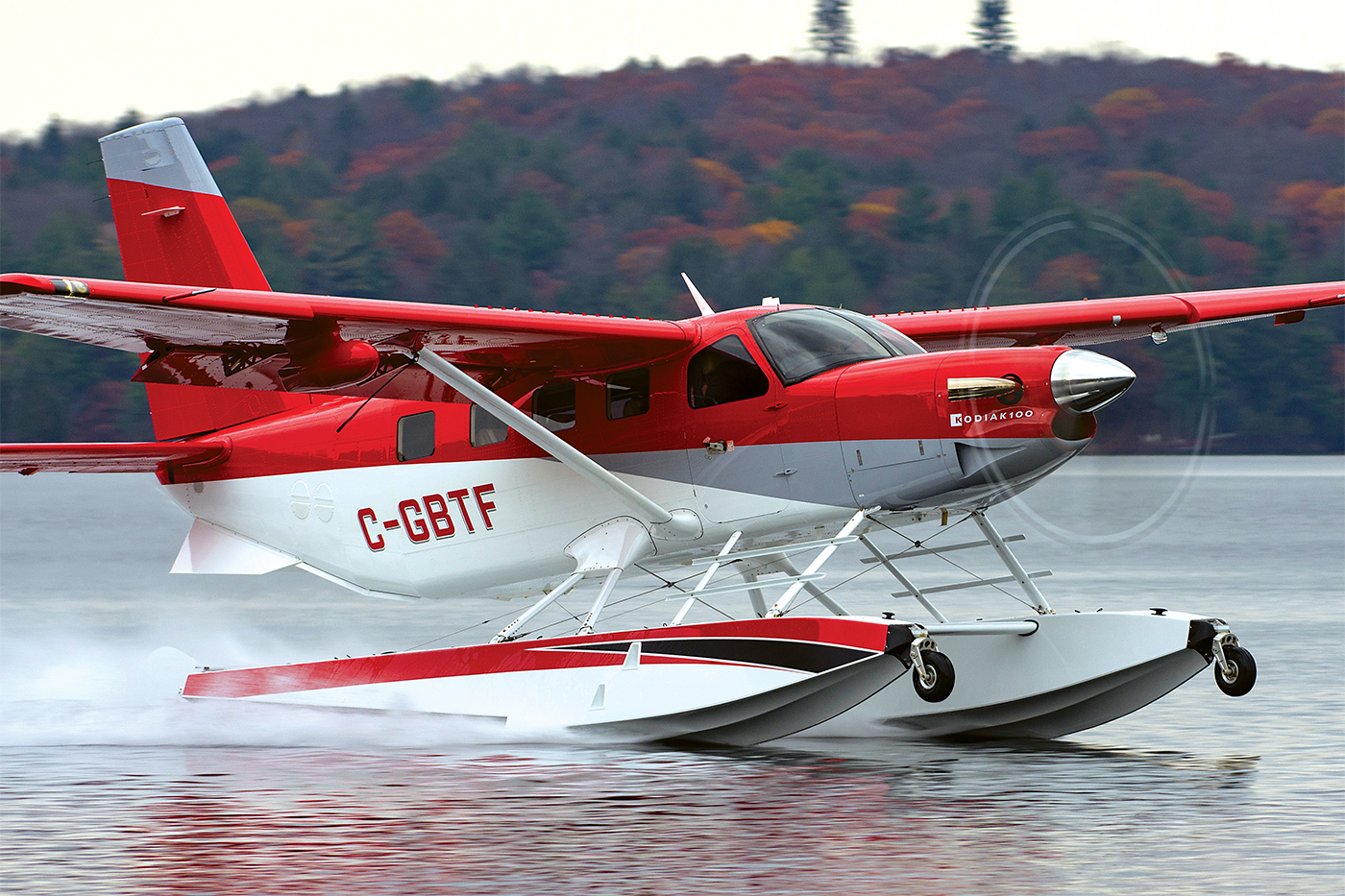Estimated reading time 11 minutes, 55 seconds.
Daher’s Kodiak 100 (formerly manufactured by Quest) is one of those airplanes that just looks robust, capable and ready for adventure.
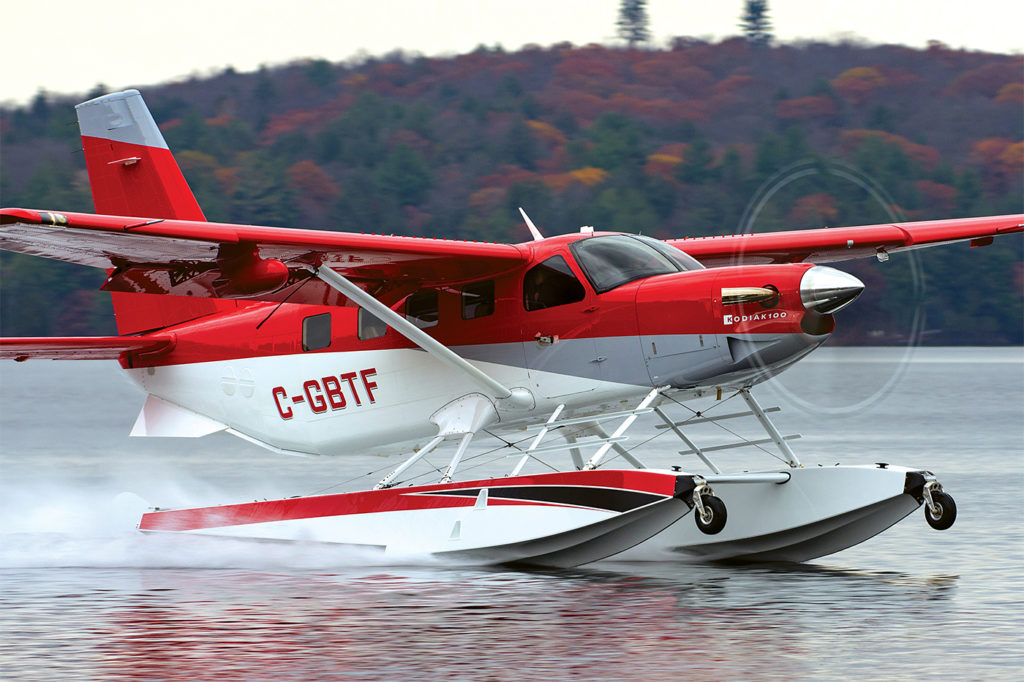
It was designed from the outset to operate away from civilization, often by pilots with limited experience in all kinds of conditions, with few support services. Many of these aircraft have been operated by humanitarian organizations in remote parts of the world.
More recently, the Kodiak has been aimed at the general aviation market in developed parts of the globe. This has resulted in the company offering more choices of interior trim levels and appointments.
Prior to this pilot report, I was well acquainted with the Kodiak when operated on wheels, and I was impressed with its short field capabilities. It is equally as impressive as a cross-country airplane as it is able to deliver 170 knots true airspeed at typical altitudes. With all the history that I had with this airplane, I was excited to have the opportunity to fly it in its amphibious configuration.
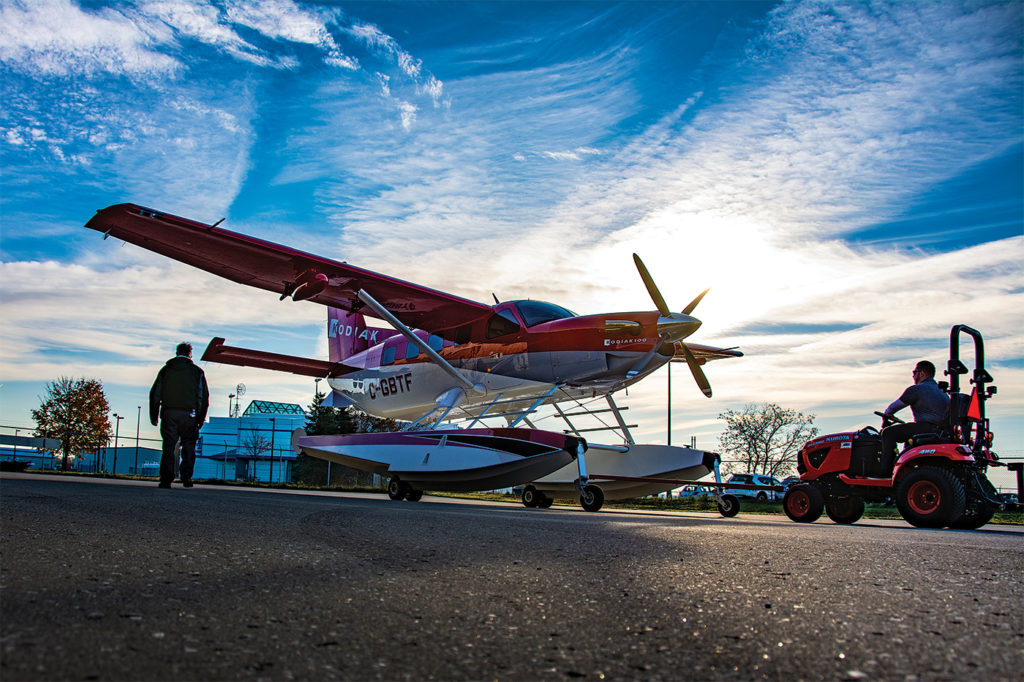
Sky-high appeal
When sitting on the ramp on its composite Aerocet 6650 floats, the Kodiak appears massive. The cockpit entry door seems to be two storeys high with a daunting climb to the top. The all-composite Aerocet floats look like a couple of small yachts attached to the bottom of the airplane, while at the same time they appear to have been specifically made for the Kodiak.
Observers will say the Kodiak has “ramp appeal.” This is just a fancy way of saying that it is an attractive airplane and apparently many people agree. I heard more than one comment that it was a “very good-looking airplane” when it was parked on the ramp at my home airport.
Ramp appeal should never be underestimated because, after all, who wants to buy an ugly airplane? My own opinion is that the Kodiak has very nice lines and that it exudes the aura of a brawny, well-built and capable aircraft. It is classically good looking in the same way as a Norseman, Beaver, Otter or Caravan. Indeed, the aircraft the Kodiak is most compared to and often confused with is the latter.
I think if I was a Kodiak owner, I would become tired of hearing my airplane described as being “kind of like a Caravan.” This is not to say that Cessna does not produce a fine airplane; its sales success and track record are well documented, and the comparison is normally meant as a compliment. However, I believe this comparison does not adequately recognize the Kodiak’s attributes, most notably its excellent handling and truly impressive short and rough field capabilities.
I love this airplane for the fact that you don’t need to be an amazing pilot to make it do amazing things. These benefits are magnified when the airplane is equipped with amphibious floats and the result is a very pilot-friendly experience.
The key to this superior handling is the design of the wing, which incorporates a discontinuous leading edge, making the Kodiak a stable and predictable platform at any speed. It always feels “right,” and the pilot can be confident that the airplane is designed to look after everyone on board. Keep in mind that this airplane was originally conceived to be flown by low-time pilots in some of the most remote parts of the world. One has to think that a weekend cottage run or fishing trip should be a cakewalk.
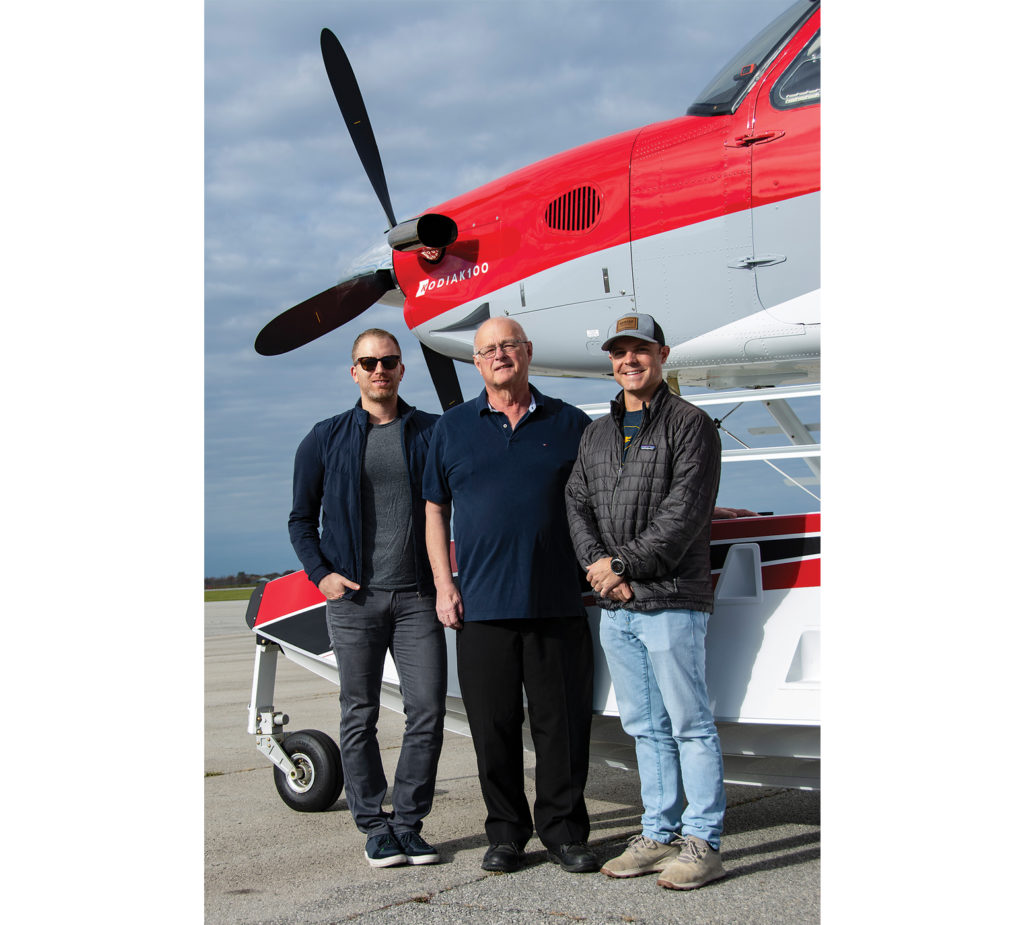
The cockpit of the Kodiak is thoroughly modern which belies its “classic” exterior. The most notable flight deck feature is the presence of Garmin’s G1000NXi avionics suite, augmented by several other touches that scream anything but “bushplane!” This is not your grandfather’s de Havilland DHC-2 Beaver; there is no dizzying array of round dials, needles, warning lights and switches for the pilot to manage.
The instrument panel is wonderfully uncluttered and functional. Pilots should adjust easily to the three-screen version of the G1000, which incorporates two primary flight displays (PFDs) and a centre multi-function display (MFD). All required information is beautifully displayed and easy to interpret. The G1000 integrates all necessary engine parameters with layers of navigation, weather, flight guidance and other supplementary information. There is no separate annunciator panel to display system faults and malfunctions as would be expected in an aircraft of this category in the “dark ages” before the advent of glass.
Even the interior climate is digitally controlled, with no levers to manually open and close valves to allow the cabin to be heated or cooled. The result is that the pilot has access to all the information required to safely fly the airplane under visual or instrument flight conditions, including synthetic vision and terrain avoidance. This is a valuable safety feature considering the Kodiak may be expected to operate in remote areas away from the helpful eyes of air traffic control.
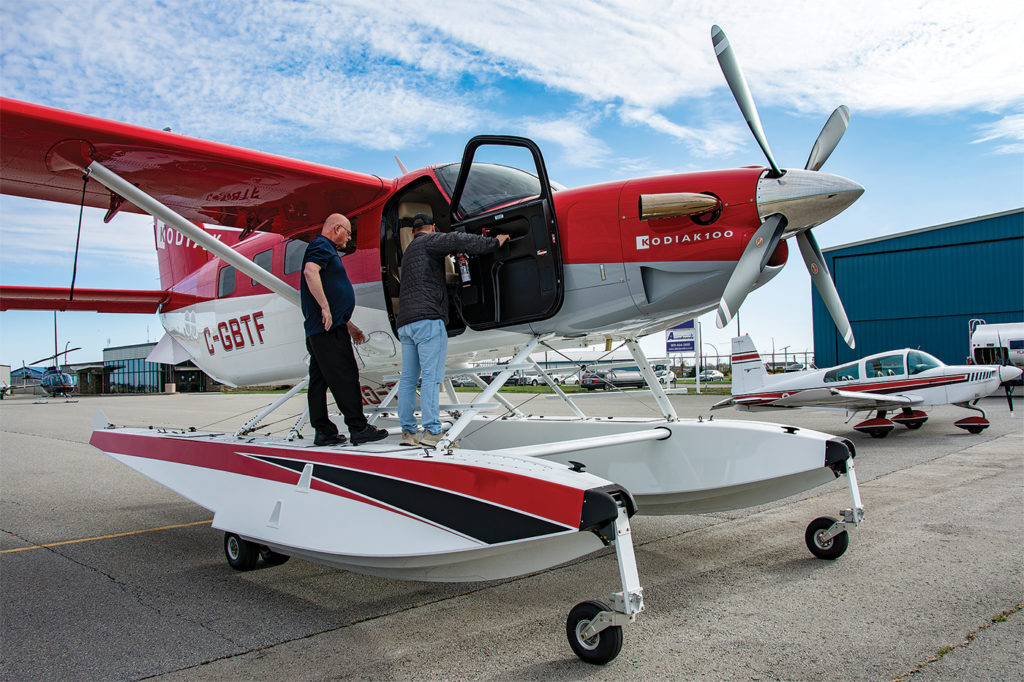
Notwithstanding its back-country capabilities, the Kodiak is well equipped to operate in the world’s busiest airspace in instrument meteorological conditions (IMC) while minimizing pilot workload.
This airplane is uncommonly versatile and offers the owner unlimited options for prospective destinations. The flight test airplane was equipped with the optional Garmin radar combined with the capability to display XM satellite weather on the large MFD for increased pilot awareness. Operators who are determined to maximize the utility of the airplane would do well to add weather radar for summer operations and to consider the optional Flight Into Known Icing (FIKI) package for winter. Admittedly, the FIKI system is not certified while the airplane is on floats, but this aircraft is a true four seasons machine when appropriately equipped. It’s a great floatplane but it’s not just a floatplane; think of it as a luxury SUV that can pretty much go anywhere at any time.
The passenger cabin is well appointed, spacious and comfortable. The aft cabin is entered through a huge door that not only makes entry easy via the wide steps integrated into the lower door, but it also facilitates loading and unloading just about anything you can legally stuff into the back of the airplane. I’m pretty sure if you had to move a jet ski, central air conditioner or furnace it would fit in the back cabin of this airplane to be transported wherever it needed to go.
All that utility doesn’t mean that passenger comfort is sacrificed. The flight test airplane was outfitted with the “mid” grade trim level, but it is doubtful that anyone would ever complain about the interior. If a more utilitarian interior is desired or needed, the “basic” trim level could be selected. If unbridled luxury is your thing, you might consider upgrading to the premium trim level. Passengers are seated in individual chairs with ample elbow and head room; there is even an aisle down the centre like a business jet or airliner. This is a nice contrast for those whose experience with floatplanes is limited to being shoehorned into Cessna 180s, 185s and 206s.
I was honoured to make the evaluation flight for this article with factory pilot Mark Brown. His capabilities as a pilot and his skill handling the Kodiak are only matched by his passion for the brand. I have rarely been able to stump him with any question I might ask with respect to all things Kodiak, and he handles the aircraft with ease and confidence whether on land or water.
Our flight occurred soon after the French company Daher purchased Quest, making the Kodiak a stablemate with its TBM line, the pressurized, high-flying, fast-moving turboprop single.
I am hopeful that Daher’s expertise and worldwide reputation will increase awareness of the Kodiak and that it will translate to increased sales for an airplane that so richly deserves it.
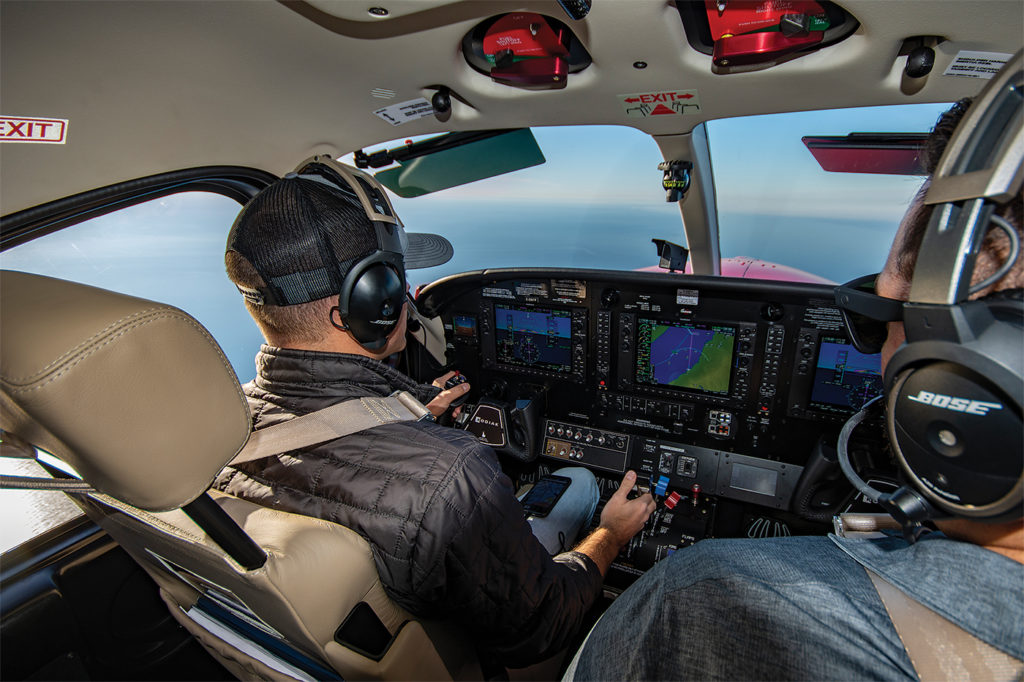
Let’s go flying
My flight in the amphibious version of the Kodiak began on land.
Starting the Pratt & Whitney Canada PT6A-34 is similar to starting other aircraft equipped with this engine, with one added feature: the propeller can be locked to prevent the aircraft from moving when it is on water and unmoored. This is a great feature since turboprops produce significant thrust at idle and the Kodiak would simply run away from the dock if this was not installed.
Taxiing the airplane on the “mile high” Aerocet amphibs is much easier than one might expect. It is easily steered with differential braking and it goes pretty much where you expect it to go. Equally satisfying is the takeoff run, which I completed by following Brown’s clear, simple directions. “Set power, slight back pressure on the yoke, keep straight.”
Before I knew it, we were airborne and climbing like an elevator. Admittedly, we were well under the maximum allowable gross weight of 7,355 pounds, but it was nevertheless impressive. The takeoff run is listed as 975 feet at maximum weight at sea level when on amphibious floats; I estimate that our ground run was about half that when departing at our lighter weight. Impressive!
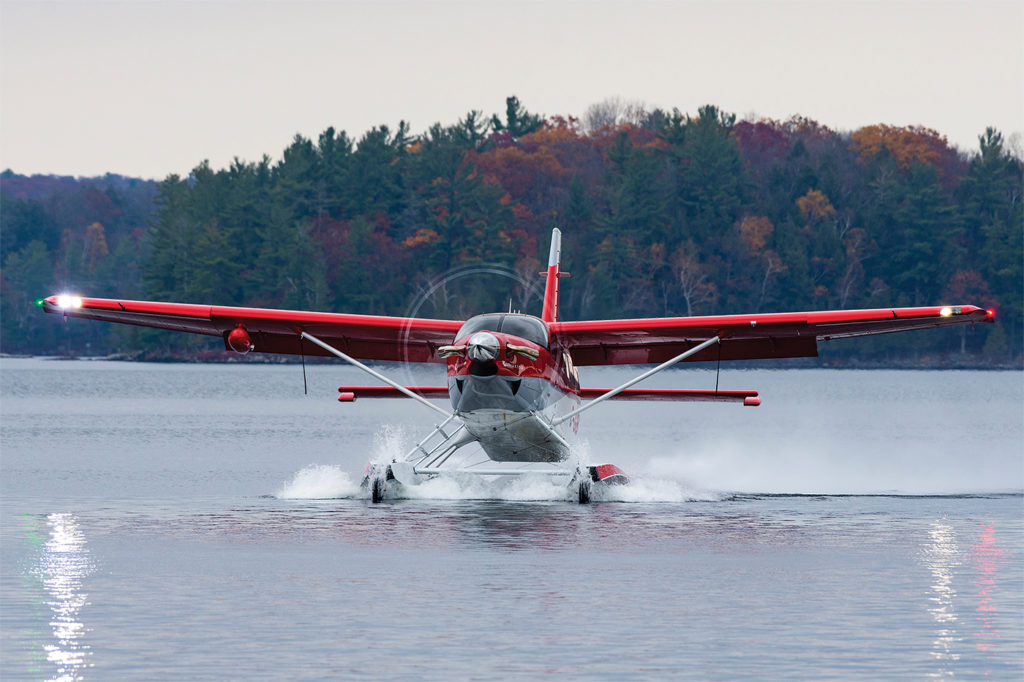
During some local flying I was able to enjoy the airplane’s superb handling and creature comforts. The flight manual supplement issued for float operations states that pilots can expect to incur a seven to eight per cent penalty in cruise speed versus the same aircraft on wheels. Practically speaking, this translates into a 10 to 14 knot penalty with the floats hanging under the airplane, meaning a cruise speed of 150 to 160 knots is possible. That’s not bad for an airplane with such impressive runway and water performance.
Finally, it was time to sample the capabilities of the Kodiak on water. The approach to landing was easy and extremely stable. It would be possible for even a novice float pilot to safely fly the airplane to some tight spots in a variety of water conditions. In the hands of an experienced float pilot, I am certain that the Kodiak can be operated into small lakes that are not accessible in other airplanes.
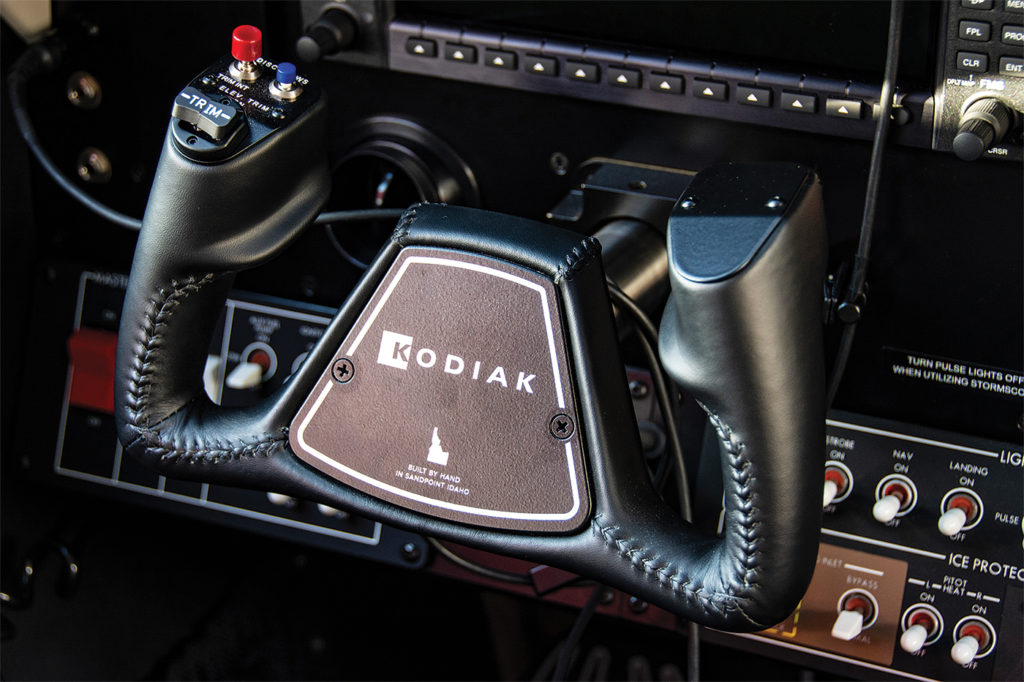
Taxiing the airplane “on the step” is rock solid and frankly a ton of fun. I think the smile on my face will need to be surgically removed! The takeoff from the surface of the water is equally impressive and just as easy as departing from a runway.
The flight manual suggests that at maximum weight the takeoff run on water should last a brief 23 seconds. I was having too much fun to use a stopwatch, but I have no reason to doubt the manufacturer’s claim.
All too soon, we were lined up for a runway landing, taking great care to ensure that we had the landing gear in the “down” position. I am sure that the soft touchdown was more attributable to the excellent design of this airplane than any high skill on my part.
The saddest part of this experience was watching the airplane leave without me – but at least I still have the smile!
Conrad Hatcher is a current corporate pilot, Class 1 flight instructor and pilot examiner. He is a lifelong aviation enthusiast and all-around aviation geek. In 20,000-plus hours of flying he has had the opportunity to fly many general aviation aircraft. His friends say that he can always be counted on for an opinion and most of them will admit (privately) that on aviation matters, he is usually correct.
